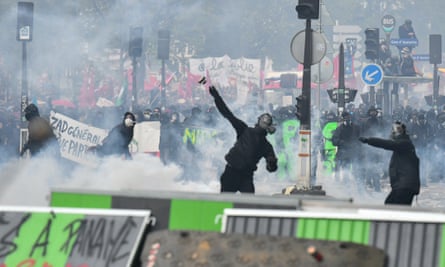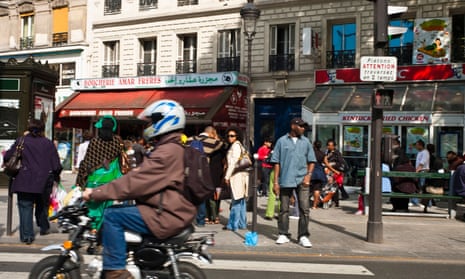Paris is commemorating the 50th anniversary of Mai 68, which scholar Kristin Ross describes as “the largest mass movement in French history, the biggest strike in the history of the French workers’ movement”. Tours and exhibits dot the city – most dwell on the solidarity between French students and workers, something still manifest today in the anti-Macron protests.
But one conference offered a different picture of 68. Bandung of the North was held in an outlying area, Saint-Denis, in the amphitheatre of a workers’ hall filled to capacity for three days with activists, organisers and scholars; the speakers were all people of colour. It looked back, not to 1968, but to the landmark Bandung conference of 1955, where representatives of the non-aligned countries of Asia and Africa gathered to discuss common concerns and strategies. Bandung of the North provided a revolutionary way of understanding the current tensions and debates in France around race, immigration and refugees. It confronted France (and all colonial and imperialist powers) with the legacy of its imperial project and its attempts to downplay the political, social and cultural effects of that legacy under the guise of a French “republic”.
It placed issues of race, immigration, misogyny, Islamophobia, antisemitism and Palestinian rights within the context of colonialism and neocolonialism. It was a sustained argument for the logic and legitimacy of seeing all these issues as part of a whole. The sociologist Nacira Guénif-Souilamas said it was “a way to distance ourselves from the narrative of 1968, as it was told in the mainstream media by the French elite, who feel that 1968 belongs to them. Things are happening now that require another narrative of what 68 was. We [indigenous people of colour] do not belong to the north – we happen to be in the north. Therefore we have a vantage point to understand the north in a particularly critical way.”
The event addressed social and political issues from a point of view France has tried to discredit in order to preserve its image as democratic, modern and rational. But the alibis used to whitewash colonisation have only postponed a final reckoning that is manifest in stark terms today. The political activist Angela Davis was one of the speakers, and insisted on the need to render understandable the fact that the great migrations of indigenous people to the north were caused by coloniality, war, poverty and global capitalism. Consequently, besides offering an analysis of that historical fact, we are ethically called on to offer comfort to those compelled to migrate, and to defend them against the exploitation and dehumanisation carried out by the racist state.

The conversations that took place during the event were unflinchingly self-aware and self-critical: how to understand what feminism might look like in diverse racialised communities, how can we understand our own racisms, and what issues emerge when we attempt alliances with the white left? At base was the commitment to identify and reject any attempts by the right to “divide and conquer”.
The conference worked through interconnections. People talked about how Judeo-Christian ideology underwrites sexism, misogyny and Islamophobia. How anti-Muslim hatred reinforces anti-black, anti-Latinx, anti-Asian, and anti-indigenous sentiments and sets the conditions for the unleashing of antisemitism. The response was to consider how solidarity across different groups was the logical and necessary response to common sources of oppression. Davis remarked that it was “hard to imagine the rise of Black Lives Matter without the assistance of the Palestinians”; those at the conference acknowledged that the struggle of the Palestinians was the iconic and exemplary fight for liberation today.
Houria Bouteldja, one of the organisers of the conference, told me: “The main idea is to understand that we are a new social and political reality. When I say ‘we’, I mean postcolonial subjects, racialised subjects in the west. We are a south in the north. We are not the ‘wretched of the earth’, but we are racialised people in the north.” The idea was to use the privilege that accrues to people of colour and others in the north to build an international decolonial movement.
Crucially, this solidarity is taking place in the streets, too. Denis Godard, an anti-racist activist and a coordinator of the “Solidarity March” told me it was “built around migrant committees and families and against police brutality. It was supported by many associations, trade unions and local solidarity committees.”
Colonialism has never gone away, nor have its effects. There are still vestiges of it in “territories”, “protectorates” and other arrangements that exist. Neocolonial structures exist in “trade zones”, “special understandings” and other euphemisms that seek to hide the foundational aspect of colonialism – violence in myriad forms against people of colour and the white underclass. Neoliberal regimes and networks make this condition increasingly global. The fight to decolonise requires precisely the transnational alliances, solidarities and shared process of critique that we found in Bandung of the North.
